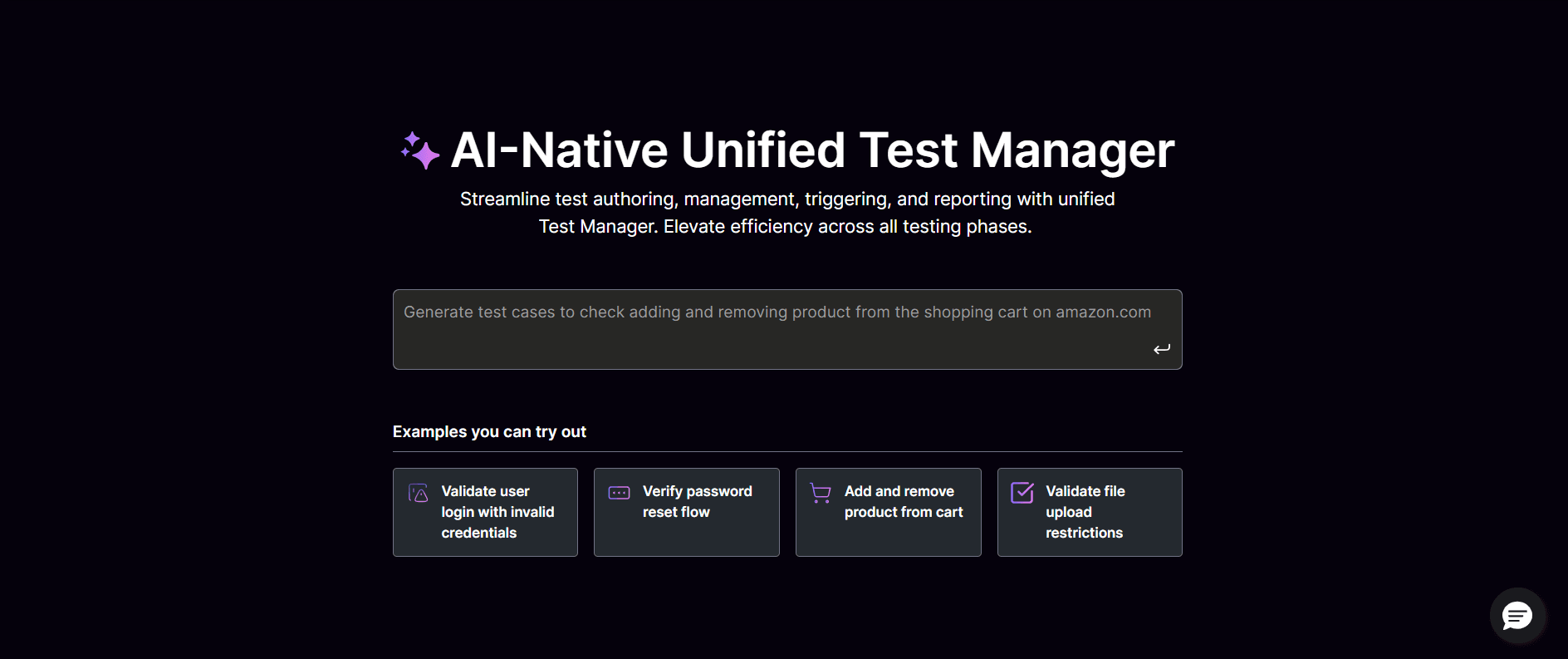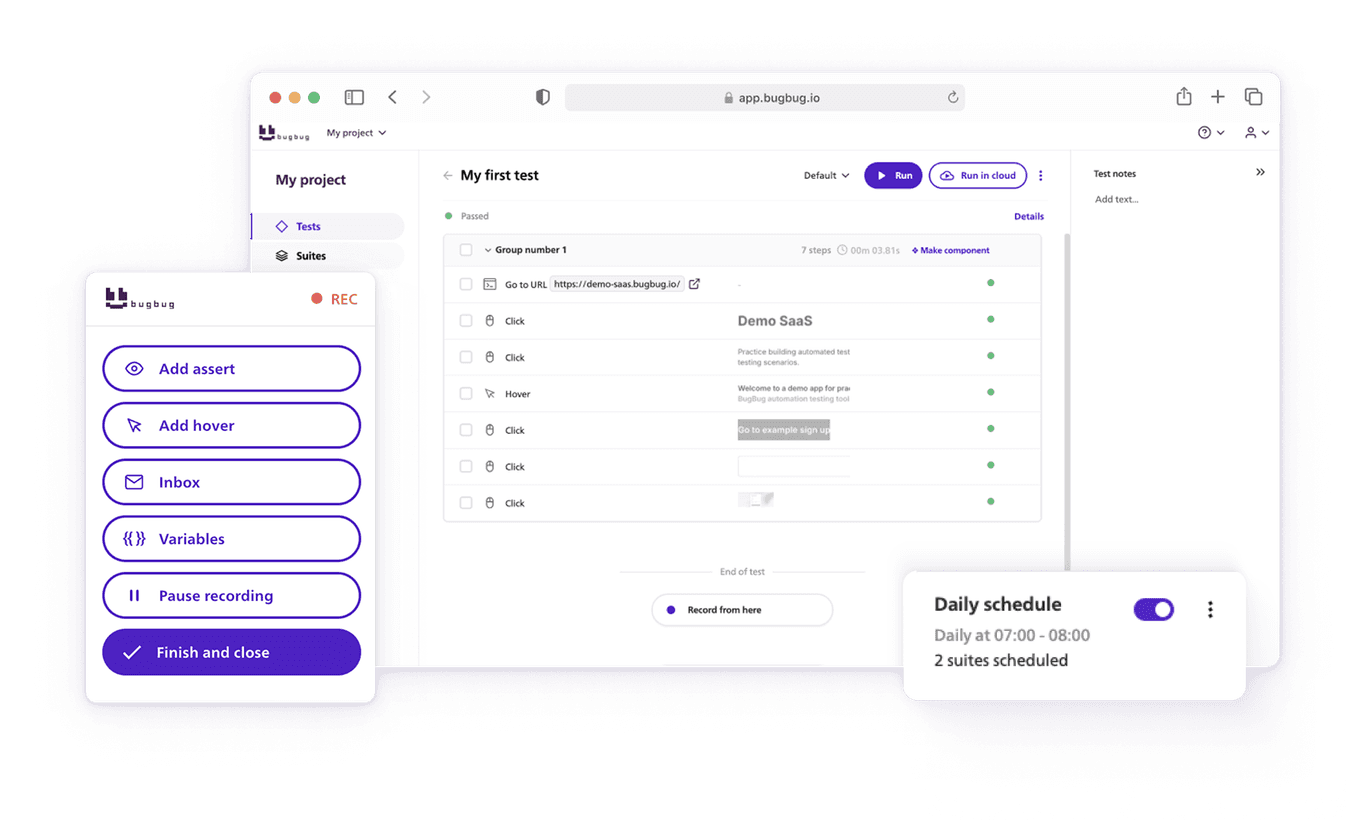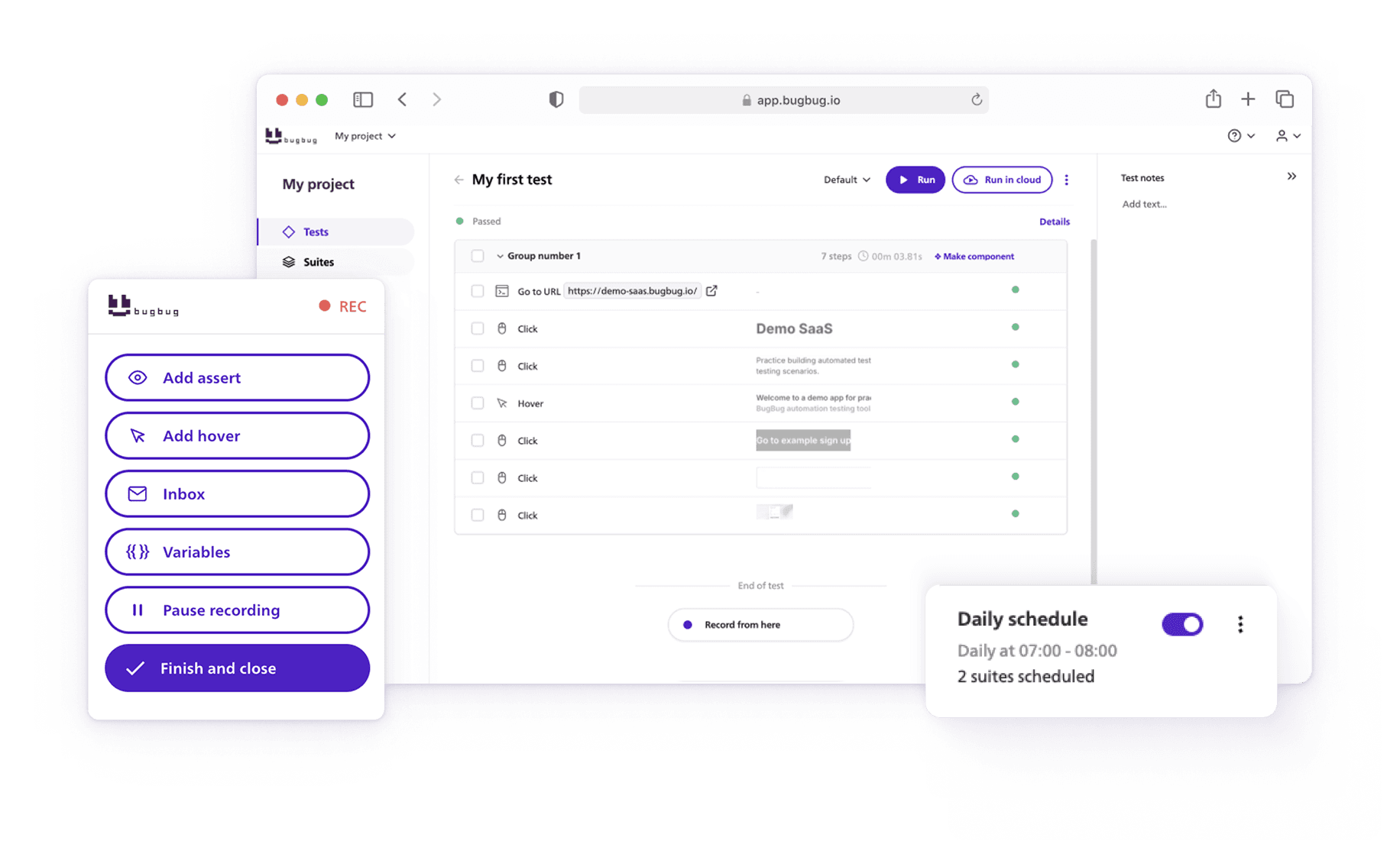🤖 Summarize this article with AI:
💬 ChatGPT 🔍 Perplexity 💥 Claude 🐦 Grok 🔮 Google AI Mode
Effective test management software is crucial for organizing test cases, automating processes, and ensuring smooth collaboration across development teams.
While qTest is a popular tool for many testing teams, there are several alternatives available that offer similar or even enhanced functionalities.
Whether you're looking for a tool with more customization options, better integration capabilities, or a budget-friendly solution, exploring qTest alternatives can lead you to a test management system that better suits your needs.
- 🎯 TL;DR - qTest Alternatives in 2026
- Best qTest Alternatives for 2026
- Tricentis qTest Pros & Cons
- Why Consider Tricentis qTest Alternatives?
- How to Choose a Test Management Tool
- Top qTest Alternatives in 2026
- TestRail — Best for Comprehensive Reporting
- Zephyr — Best for JIRA Integration
- LambdaTest Test Manager - An AI-Native Unified Test Management Platform
- Xray — Best for Agile and DevOps Teams
- PractiTest — Best for End-to-End Test Management
- Kualitee — Best for Simplicity and Affordability
- Testpad — Best for Lightweight Test Management
- GitHub — Best for Version Control and Collaboration
- BugBug - Codeless and User-Friendly Tool for Web Applications
- How to Choose The Right Test Management Platform?
🎯 TL;DR - qTest Alternatives in 2026
Best qTest alternatives include:
-
TestRail: Best for comprehensive reporting; integrates well with JIRA and CI/CD tools.
-
Zephyr: Best for JIRA integration; supports manual and automated testing with real-time tracking.
-
LambdaTest Test Manager: Best for Jira-centric teams and teams migrating from legacy tools.
-
Xray: Best for Agile and DevOps teams; offers deep JIRA integration and CI/CD support.
-
PractiTest: Best for end-to-end test management; supports requirements, testing, and defect tracking.
-
Kualitee: Best for simplicity and affordability; ideal for small to mid-sized teams needing essential features.
-
Testpad: Best for lightweight test management; great for exploratory and manual testing with a checklist-based UI.
-
GitHub: Best for version control and collaboration; not a full test management tool but supports automated testing workflows.
-
BugBug: Best for codeless web test automation; intuitive and powerful tool with Edit & Rewind and CI/CD integration.
Check also:
Best qTest Alternatives for 2026
Choosing the right test management platform is crucial for any QA team looking to streamline their testing efforts. An effective test platform should be an easy-to-use solution that integrates seamlessly with other tools, such as GitHub, to manage both manual and automation testing processes. Whether you're creating test cases or running tests in real time, a solid test automation tool helps ensure thorough coverage.
Modern SaaS testing tools provide comprehensive ALM (Application Lifecycle Management) support, allowing teams to create tests and monitor performance efficiently. With the right testing tool, teams can seamlessly improve collaboration, manage resources, and scale testing efforts.
Check out our list of the best free test management tools on the market.
Tricentis qTest Pros & Cons
qTest Pros
- Comprehensive Test Management: qTest offers robust features for test case creation, management, execution, and reporting, covering all aspects of the testing lifecycle.
- Seamless Integration with Popular Tools: It integrates well with tools like JIRA, Jenkins, Selenium, and other automation frameworks, allowing teams to sync their development and testing efforts smoothly.
- Support for Agile and DevOps: qTest is designed to support Agile and DevOps methodologies, enabling continuous integration (CI) and continuous delivery (CD) testing practices.
Choose codeless testing with BugBug
Test easier than ever with BugBug test recorder. Faster than coding. Free forever.
Get started
qTest Cons
- Cost: qTest’s pricing can be relatively high, especially for small to medium-sized teams. Larger organizations with extensive testing requirements might find it worthwhile, but smaller teams may need more budget-friendly alternatives.
- Complexity for New Users: The wide range of features and functionalities can make qTest difficult to learn for new users, requiring a significant learning curve to get fully comfortable with the platform.
- Limited Features in Lower-Tier Plans: Certain features, such as advanced reporting and integrations, are only available in higher-tier plans, limiting the capabilities of the lower-cost versions.
- Limited Customization for Automation Frameworks: While qTest integrates with many automation tools, customization options for automation frameworks can be limited compared to some competitors.
- UI Could Be More Intuitive: Some users feel that the user interface, while functional, could be more intuitive and modern, especially for teams that prioritize ease of use.
By considering these pros and cons, teams can better evaluate whether qTest is the right test management solution for their needs or if they should consider alternative options.
Why Consider Tricentis qTest Alternatives?
qTest is widely known for its test case management and seamless integration with Jira. However, some teams may find it expensive or lacking in certain advanced features. The qTest alternatives listed below can provide:
- Cost-effective solutions with both free and premium versions.
- Advanced integration with DevOps tools, automation frameworks, and CI/CD pipelines.
- Flexible deployment options (cloud-based or on-premise).
- Ease of use for teams with limited technical expertise.
Choosing the right software test automation tool depends on your team’s needs and workflow. qTest alternatives range from feature-rich enterprise tools to lightweight solutions for smaller teams. Try a few to find the best fit for your organization.
Automate your tests for free
Test easier than ever with BugBug test recorder. Faster than coding. Free forever.
Get started
How to Choose a Test Management Tool
When evaluating qTest alternatives, consider the following factors:
- Project Requirements: Does your team manage mostly manual or automated test cases? Are you testing mobile apps, web apps, or both?
- Ease of Use: The tool should have a user-friendly interface and a simple setup process.
- Integration Capabilities: Ensure the tool can integrate with your existing tech stack, whether it's Jira, Jenkins, or your preferred test automation framework.
- Scalability: Choose a tool that can scale with your growing project needs.
- Budget: Many tools offer free tiers or open-source versions, but premium features often come at a cost. Balance your budget against your testing needs.
Top qTest Alternatives in 2026
TestRail — Best for Comprehensive Reporting

TestRail is a widely used test management tool known for its robust reporting features and integration capabilities. It provides a simple and intuitive interface for creating and managing test cases, test plans, and test runs.
Key Features:
- Customizable dashboards and real-time reporting.
- Seamless integration with JIRA, GitLab, and various CI/CD tools.
- API support for flexible integrations with custom workflows.
- Supports both manual and automated test case management.
Strengths:
- Highly customizable and easy-to-navigate interface.
- Strong reporting features and analytics for test coverage tracking.
- Great integration with a wide range of automation tools.
Shortcomings:
- Pricing can be prohibitive for smaller teams.
- Limited free plan.
Use Cases:
- Teams needing extensive reporting and analytics for large test suites.
- Organizations with both manual and automated testing pipelines.
Zephyr — Best for JIRA Integration

Zephyr is a leading test management solution, particularly for teams using JIRA. With both cloud and server versions available, Zephyr allows teams to manage and automate tests directly within JIRA's interface.
Key Features:
- Native integration with JIRA, enhancing issue tracking and test management workflows.
- Support for both manual and automated testing.
- Customizable dashboards and test reporting.
- Real-time tracking of test execution and test cycles.
Strengths:
- Tight integration with JIRA for seamless workflows.
- User-friendly interface with a focus on test execution.
- Good support for agile teams and DevOps practices.
Shortcomings:
- Can become costly for larger teams or organizations.
- Not as flexible for teams that don't use JIRA.
Use Cases:
- Teams already using JIRA for project management and issue tracking.
- Agile teams looking for an integrated test management tool.
Automate your tests for free
Test easier than ever with BugBug test recorder. Faster than coding. Free forever.
Get started
LambdaTest Test Manager - An AI-Native Unified Test Management Platform

LambdaTest Test Manager is an AI-native unified test case management platform that streamlines every stage of your testing process, allowing you to create detailed test cases and plans, manage builds, and track test results - all in one place.
It helps streamline test authoring, management, triggering, and reporting with unified workflows. With seamless integration across tools and platforms, it centralizes test management, making it easier to execute tests, monitor progress, and generate comprehensive test reports.
Key Features:
- Custom Test Plans: Build custom test plans, organize builds, assign cases, and run tests across browser and OS combinations.
- Multi-Format Test Case Generation: Generate structured test cases from various input formats, such as natural language, PDFs, audio, or code.
- Real Time Test Insights: Get interactive insights on total cases, execution status (passed/failed/skipped/not started), automation coverage, and trends with date filters and build summaries.
- Exploratory Testing Support: Guided exploratory flows ensure thorough test coverage with built‑in tracking, step-by-step logging, and snapshots/evidence collection.
- Flexible Customization: Includes tagging, preconditions, flexible custom fields (dropdowns, URLs, dates, booleans, users), CSV export/import, and project organization tools.
Strengths:
- NLP Test Case Generation: Natural-language test case generation significantly elevates testing efficiency.
- Unified Test Case Management: Supports manual and automation tests, exploratory workflows, and reporting, all from one interface.
- Real-Time Dashboards & Reports: Dashboards and reporting tools provide stakeholders with clear, real-time insights into progress and quality.
Shortcomings:
- Learning Curve: Teams transitioning from established third-party test management tools may require time to adapt.
Use Cases:
- Teams Migrating from Legacy Tools: Organizations looking to migrate from legacy test management tools.
- Jira-Centric Teams: Jira-centric teams looking to integrate test management, execution results, and analytics directly into their workflows.
Xray — Best for Agile and DevOps Teams

Xray is another powerful test management tool for JIRA users, offering deep integration for both manual and automated testing processes. It supports both agile and DevOps workflows, making it a great fit for continuous testing environments.
Key Features:
- Full integration with JIRA, allowing for easy issue and test case linking.
- Supports manual, exploratory, and automated testing.
- Integration with CI/CD tools like Jenkins and Bamboo for continuous testing.
- Detailed reporting and traceability for compliance needs.
Strengths:
- Excellent integration with JIRA and CI/CD tools.
- Comprehensive support for agile and DevOps teams.
- Flexible reporting options for tracking test results and coverage.
Shortcomings:
- Requires a JIRA environment, which might not work for all teams.
- Can be complex to set up for new users.
Use Cases:
- Agile and DevOps teams needing continuous integration and testing.
- Organizations requiring comprehensive traceability for audits and compliance.
Automate your tests for free
Test easier than ever with BugBug test recorder. Faster than coding. Free forever.
Get started
PractiTest — Best for End-to-End Test Management

PractiTest is an all-in-one test management tool that supports the entire testing lifecycle, from requirements management to test execution and defect tracking. It offers real-time dashboards and analytics to keep teams on track.
Key Features:
- End-to-end test management, including requirements, test cases, and bug tracking.
- Integration with JIRA, Selenium, Jenkins, and other popular tools.
- Supports both manual and automated testing.
- Customizable workflows and reporting.
Strengths:
- Centralized management of all testing activities.
- Highly customizable workflows and fields.
- Excellent customer support and regular updates.
Shortcomings:
- Learning curve for new users due to its extensive feature set.
- Pricing can be on the higher side for smaller teams.
Use Cases:
- Teams needing a comprehensive solution for test case and requirement management.
- Larger organizations looking for customizable workflows and detailed analytics.
Kualitee — Best for Simplicity and Affordability

Kualitee is a straightforward test management tool that offers essential features without overwhelming users with complexity. It’s ideal for small to medium-sized teams looking for an affordable alternative to qTest.
Key Features:
- Test case management, defect tracking, and test execution tracking.
- Integration with JIRA, Jenkins, and other popular tools.
- Simple, user-friendly interface.
- Affordable pricing with both cloud and on-premise options.
Strengths:
- Easy to use and set up, even for non-technical users.
- Affordable pricing for small and medium-sized teams.
- Basic but effective test management and reporting features.
Shortcomings:
- Limited advanced features compared to other tools.
- Reporting and customization options may feel basic for larger teams.
Use Cases:
- Small teams or startups needing a simple test management solution.
- Projects with limited budgets but essential testing requirements.
Automate your tests for free
Test easier than ever with BugBug test recorder. Faster than coding. Free forever.
Get started
Testpad — Best for Lightweight Test Management

Testpad is a lightweight, flexible tool designed for exploratory testing and manual test case management. It’s ideal for teams that don’t need the complexity of full-featured test management tools but still require a structured way to manage test cases.
Key Features:
- Simple, checklist-based interface for test management.
- Real-time collaboration and easy test case organization.
- No formal test case language required; great for exploratory testing.
- Supports integration with JIRA and other issue trackers.
Strengths:
- Extremely easy to use and navigate.
- Great for teams that prioritize exploratory or manual testing.
- Affordable and flexible pricing plans.
Shortcomings:
- Limited support for automation and advanced test case management.
- May not scale well for larger projects or teams.
Use Cases:
- Teams focusing on exploratory testing or manual test management.
- Smaller teams looking for a lightweight and affordable solution.
GitHub — Best for Version Control and Collaboration

GitHub is a widely-used platform for version control, collaboration, and code management, making it an essential tool for development and QA teams. It integrates smoothly with various test management platforms, enabling teams to keep their test scripts in sync with the development codebase.
Key Features:
- Seamless version control for test scripts and automation code.
- Supports collaboration with built-in code review and commenting features.
- Integration with CI/CD tools for automated testing and deployment.
- GitHub Actions for automating workflows and running test cases directly from repositories.
- Extensive ecosystem of integrations with testing, monitoring, and project management tools.
Strengths:
- Excellent version control for code and test management.
- Strong community support and extensive documentation.
- Flexible integration with test automation tools and CI/CD pipelines.
Shortcomings:
- Primarily a development platform, so it lacks some native test management features.
- Complex workflows may require deeper knowledge of Git for non-technical team members.
Use Cases:
- Version control and collaboration for automated test scripts.
- CI/CD pipeline integration for continuous testing and deployment.
- Collaboration between developers and QA teams for managing and reviewing code changes.
Automate your tests for free
Test easier than ever with BugBug test recorder. Faster than coding. Free forever.
Get started
BugBug - Codeless and User-Friendly Tool for Web Applications

BugBug is a platform designed specifically for web application testing, focusing on ease of use while offering powerful automation capabilities. It’s an ideal solution for teams aiming to streamline their test automation processes efficiently. BugBug balances simplicity with robust features, providing an intuitive interface and smooth integration into existing workflows.
Key Features:
- Cloud-based testing for scalable and flexible test management
- User-friendly interface for creating and managing test cases
- Automated test execution and scheduling
- Seamless integration with CI/CD pipelines
- Detailed analytics and reporting for better insights
- Edit & Rewind, you can edit your test and rewind the playback position from any selected point
Strengths:
- Effortless automation: The built-in recorder allows for quick test case creation without the need for coding.
- Advanced automation: Supports complex test scenarios and repetitive tasks with ease.
- Integration capabilities: Simple integration with CI/CD pipelines to support continuous testing.
- Scalable testing: Cloud-based testing enables scalability and remote access.
- Collaboration tools: Teams can easily share test cases and results, improving collaboration and efficiency.
Shortcomings:
- Limited focus on manual test management.
Use Cases:
- Web application testing: Ideal for teams automating tests for web-based applications.
For teams looking for the best test management solution, the best Tricentis qTest alternatives offer robust test case management tools, with qTest stacks leading the way in SaaS test management. From unified testing solutions to test automation platforms, these tools empower QA teams to handle complex testing needs across a variety of projects. By leveraging top software testing tools, teams can improve collaboration, manage test cycles effectively, and make informed decisions about quality.
How to Choose The Right Test Management Platform?
Choosing the right test management platform is vital for streamlining both automated and manual testing processes. Whether you're using qTest features, QMetry Test Management, or looking for top alternatives like OpenText ALM Quality Center, the goal is to find a tool that allows you to efficiently manage test cases and test execution while supporting business processes and ensuring thorough functional testing.
Automate your tests for free
Test easier than ever with BugBug test recorder. Faster than coding. Free forever.
Get started
Unified test management platforms are designed to help teams manage a range of test types, from visual testing to automated scripts. Tools like Test Management for JIRA and BrowserStack, which is the leading test automation platform, provide powerful integrations that make it easier to manage and execute both automated and manual tests.
Ultimately, whether you're looking for top test automation tools or platforms like QMetry and qTest, selecting the right tool for your needs will significantly enhance your business process and ensure high-quality software delivery.
Happy (automated) testing!



